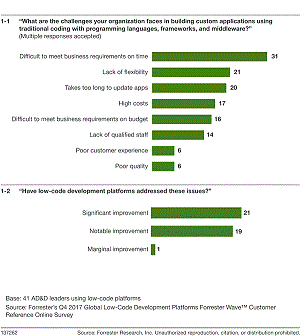News
Analyst: Enterprise Low-Code Dev Platforms 'Here to Stay'
- By David Ramel
- October 26, 2017
Remember when visual, point-and-click, drag-and-drop, wizard-driven "programming" tools were seen as gimmicky, capable of producing only amateurish, quick-hit knock-offs unsuitable for the enterprise trenches?
Those days are over.
The low-code movement has arrived in a big way to meet the insatiable demand for enterprise apps -- espcially for mobile -- in the face of an industry-wide skills shortage. Large research firms such as Gartner Inc. and Forrester Research Inc. are paying increasing attention to the space. Within the past couple of years, such firms for the first time have targeted low-code tools with analytic reports of their own.
In the latest such report, Forrester sums up the situation: "Mounting evidence shows that low-code development platforms are here to stay."
Forrester was among the first of such large research firms to grant low-code tools first-class status in the app development arena, even separating out the mobile-centric offerings. Gartner got in on the act also, in April issuing its own report on "Enterprise High-Productivity Application Platform as a Service."
In the new Forrester Wave report -- "Low-Code Development Platforms For AD&D Pros, Q4 2017" -- the research firm attributes the enterprise embrace of low-code tools to three primary factors: they speed up application and innovation delivery; they're useful for big applications, defying characterizations as being suitable for only departmental, non-critical applications; and they help move application development and delivery (AD&D) efforts to public clouds.
The new Wave report, published earlier this month, examines the 13 "most significant options" coming from: AgilePoint, Appian, Bizagi, K2, Kony, Mendix, OutSystems, PNMsoft, Progress Software, Salesforce, ServiceNow, Skuid and Trackvia.
Its conclusion? "Forrester's research uncovered a market in which Appian, Kony, Mendix, OutSystems, and Salesforce provide the broadest and deepest platforms. AgilePoint, Bizagi, K2, and ServiceNow offer competitive options. Skuid and Trackvia address niches. PNMsoft and Progress Software lag behind."
That conclusion was listed as one of the key takeaways from the report, which Forrester cautions should only be used as a starting point in an enterprise's more rigorous examination of the offerings for its own specific needs.
Forrester pointed to several classifications of users who leverage tools, including pros who like their productivity, and "citizen developers" of varying skill levels, such as power users and more advanced line-of-business developers. The Wave report focuses on the 13 platforms it sees as being most valuable for AD&D pros.
 [Click on image for larger view.]
Pros Get Quicker App Delivery (source: Forrester Research)
[Click on image for larger view.]
Pros Get Quicker App Delivery (source: Forrester Research)
The firm narrowed the focus of the report because each group of potential users has specific needs. Many pros, for example, "see low-code platforms as a way to very quickly deliver applications that win, serve, and retain customers -- and to nimbly evolve those apps. AD&D leaders increasingly trust low-code platform vendors to address today's use cases, as well as apps using machine learning (ML), natural-language processing (NLP), and other innovations."
In fact, the firm said, the feature richness of some of the low-code AD&D platforms that attracts pros can overwhelm some of their less-skilled brethren.
"Recognizing this, several of the vendors we evaluated have created specific tools for citizen developers without development experience, whose output pro developers can incorporate into their projects," the report says. "In our assessment's 'Citizen developer tools' criterion, we recognize only tools built for these nonprofessional developers."
On the higher end, however, the ability to provide advanced functionality and leverage cutting-edge technologies is a differentiator in the space.
"Access to innovations including NLP, ML, and real-time sensor data are key distinctions among these vendors' products," Forrester said. "But business models allowing low-friction access to platforms and nurturing partner relationships that produce packaged apps and integration adapters are equally important to future success in this market."
For the record, Forrester defines low-code development platforms as:
Products and/or cloud services for application development that employ visual, declarative techniques instead of programming and are available to customers at low- or no-cost in money and training time to begin, with costs rising in proportion of the business value of the platforms.
Some of the report's data came from a summer survey of 41 AD&D pros who use one of the examined platforms, who were recruited by vendors to complete the survey. Forrester also relied on product demos and vendor surveys.
Inclusion criteria dictated that each vendor: offer comprehensive declarative tooling; design its product/services to serve the needs and preferences of AD&D pros; have a free or "freemium" model; support the building many different types of business apps; and primarily target large enterprises.
More Coverage of Low-Code Tools Research
About the Author
David Ramel is an editor and writer at Converge 360.